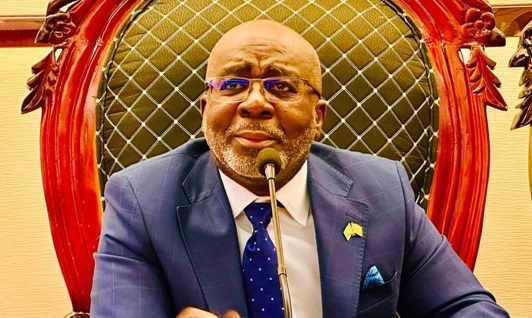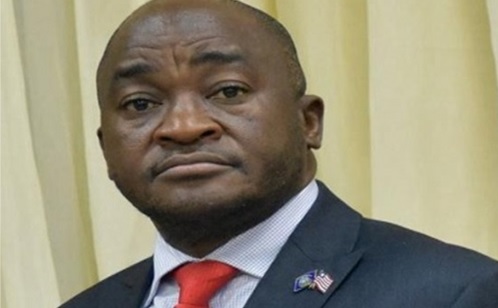Monrovia – John H. T. Stewart, a former Commissioner of Liberia’s Truth and Reconciliation Commission (TRC), has launched a fierce attack on Speaker of the House of Representatives, Cllr. J. Fonati Koffa, accusing him of undermining Liberia’s stability for personal gain. In a series of fiery Facebook posts, Stewart referred to Koffa as a “common criminal” and an “ex-convict,” arguing that his actions are harmful to the nation’s progress.
Stewart’s posts included harsh words: “This common criminal and ex-convict JFK (Jonathan Fonati Koffa) is determined to take Liberia down to satisfy his lust and craving for power. He is bad news for Liberia. He must GO. Period!” He also criticized Koffa’s past, claiming, “While Liberians were starving, you were in America stealing from poor people. Shame on you, mehn!” His remarks reflect growing discontent with Koffa’s leadership as Speaker.
The crisis in the House of Representatives has been escalating for months, with a majority bloc of lawmakers challenging Koffa’s leadership over allegations of corruption and his failure to command sufficient support for legislative duties. Despite this, Koffa insists on his legitimacy as Speaker and has refused multiple invitations to explain his actions. This deadlock has caused legislative paralysis.
In a move to assert their control, the majority bloc recently stripped Koffa of his privileges, including his personal security detail, official vehicle, and drivers. They also elected a new Speaker. Koffa has responded by taking legal action, petitioning the Supreme Court for a Writ of Mandamus to compel recognition of his authority, escalating tensions within the legislature.
The crisis took a violent turn when Koffa’s supporters, including Representatives Marvin Cole and Eugene Kollie, allegedly disrupted legislative sessions. Video footage captured Cole leading a group of individuals into the Capitol, declaring, “Nobody will be allowed to hold sessions here today. This is legislative war.” The incident occurred alongside the arrival of an ECOWAS Parliamentary delegation, led by Edwin Snowe, which sought to mediate the crisis but left without resolution.
Stewart has also accused prominent figures like Senate Pro Tempore Nyonblee Karnga Lawrence and Senator Darius Dillon of enabling Koffa’s actions, alleging they lobbied for his continued leadership, reportedly using their influence over President Joseph Boakai to secure appointments and protect Koffa. These claims have sparked public skepticism about the government’s commitment to transparency and justice.
Justice Minister Oswald Natu Tweh has been criticized for his lack of action regarding the violent disruptions at the Capitol. Stewart claims Tweh has held private meetings with Koffa and his legal team, raising suspicions of collusion. “Why is the Minister of Justice meeting with Koffa behind closed doors while the nation is in crisis?” Stewart asked. The perceived inaction from the Ministry has led many to question the government’s priorities.
In an article titled “Try as Hard as He Might, Former Speaker Fonati Koffa Cannot Reverse the Course of History,” Stewart outlined the legal and constitutional foundation for the majority bloc’s actions. He argued that Koffa’s failure to secure a quorum disqualifies him from leading the House, emphasizing that the Speaker is merely “first among equals” and not superior to other lawmakers.
The Supreme Court’s alleged directive to maintain the “status quo ante” has added another layer of complexity to the crisis. While some see it as a lifeline for Koffa, Stewart and other analysts argue that the Court lacks the authority to compel lawmakers to sit under Koffa’s gavel. This situation underscores the fragile separation of powers and challenges facing Liberia’s judiciary.
Stewart has also raised concerns about the Justice Ministry’s role in the crisis. As the government’s chief legal advisor, Minister Tweh is expected to offer impartial guidance. However, his private meetings with Koffa have led to doubts about his neutrality. Stewart has called on President Boakai to demand transparency and hold Tweh accountable for his actions.
The ongoing crisis has significant implications for Liberia’s governance. Analysts warn that the continued deadlock in the House of Representatives risks eroding public trust in democratic institutions. The lawmakers’ failure to resolve their differences has prompted questions about their commitment to serving the people.
Meanwhile, citizens are becoming increasingly frustrated with the legislative gridlock. Many have voiced their dissatisfaction on social media, echoing Stewart’s calls for accountability. The public outcry highlights the urgency of resolving the crisis to prevent further instability.
In his final remarks, Stewart delivered a bold message to Koffa and his supporters: “Try as hard as you might, you cannot reverse the course of history. The will of the people will always prevail.” His words have become a rallying cry for those demanding justice and transparency in Liberia’s political system.







